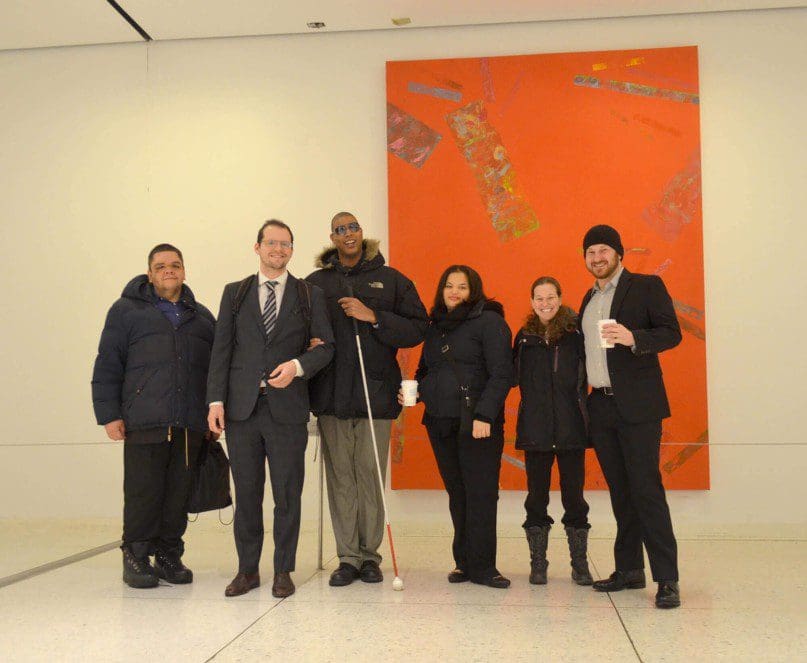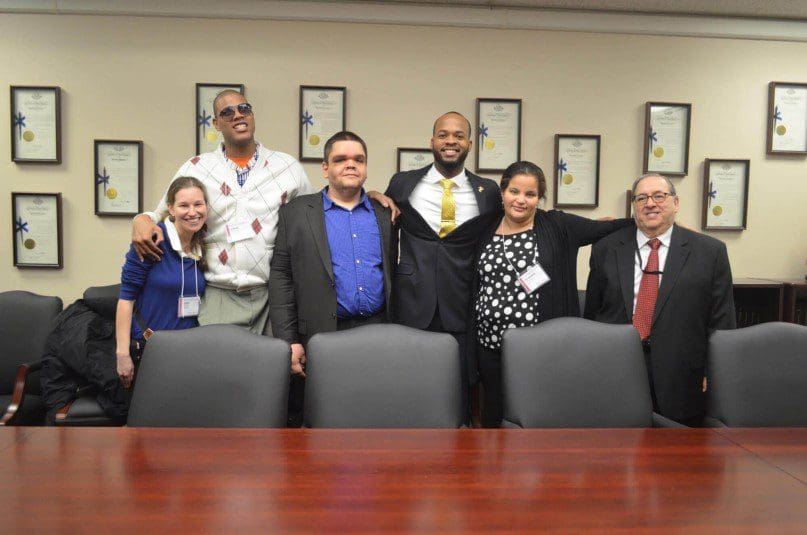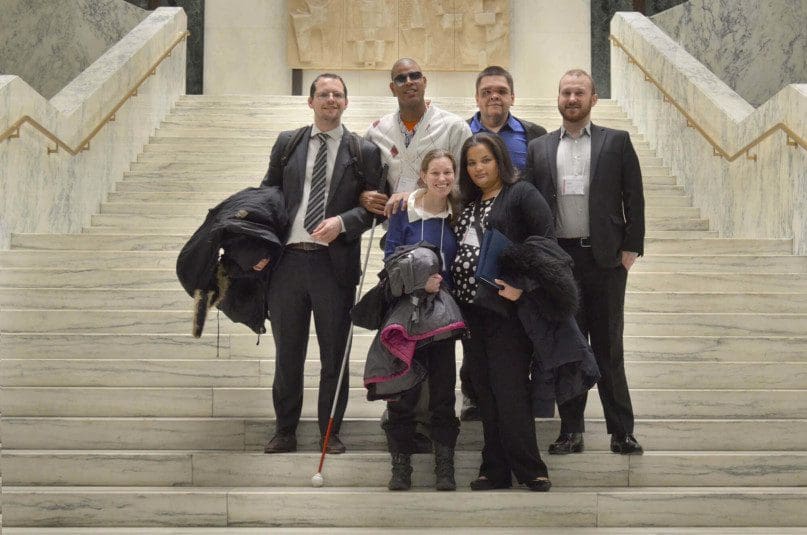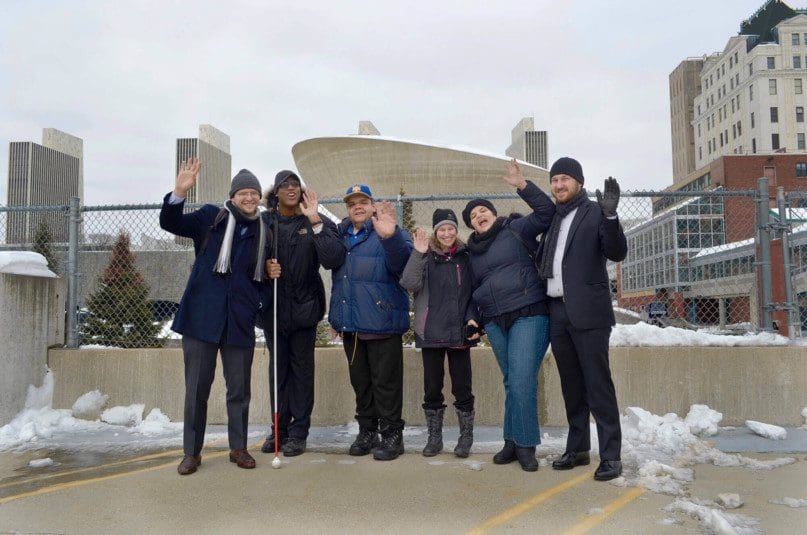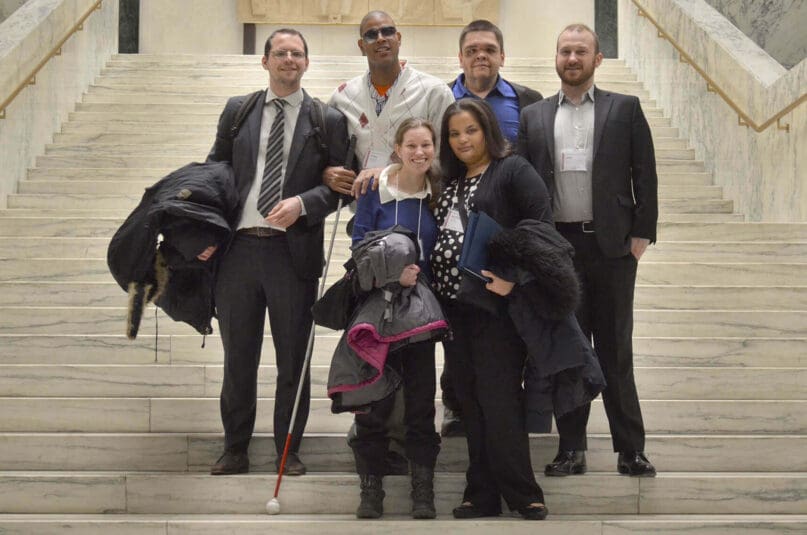On Sunday, February 12, 2017, self-advocates receiving services through AHRC New York City traveled to Albany, NY to attend a series of meetings with legislators, legislative leaders and the Governor’s staff, and to attend the NYSACRA – NYSRA Legislative & Policy Forum. The three day trip provided Kristin Thatcher, Chad DeRoche, Victor Carrion, and Andreina Martinez with opportunities to discuss their own chosen topics directly with public officials. Along for the ride were AHRC NYC staff, Matt Estep, Curriculum Developer, EBS – Brooklyn, Nicholas Legowski, Self-Advocacy Advisor, Steve Towler, Assistant Executive Director, and Scott Dodson, Communications and Website Manager.
The trip, (the third of its kind,) was the culmination of meetings of the Self-Advocacy Leadership Committee, a group of self-advocates who work together to identify and address issues of importance to people with intellectual and developmental disabilities. During their meetings, they learn strategies for effective advocacy, with guidance from AHRC NYC’s Senior Policy Advisor, Al Kaplan. Over the course of the three-day trip, the self-advocates participated in 14 separate meetings, delivering practiced talking points to State Senators, Assembly Members, and/or their aides.
Self-Advocacy Should be Taught in Public Schools
Kristin Thatcher has received services through AHRC NYC for eight years. She is a graduate of the Melissa Riggio Higher Education Program at the College of Staten Island, and about two years ago, she began working at AHRC NYC as a Community Support Professional, (CSP) lending her unique perspective to the support of people with intellectual and developmental disabilities.
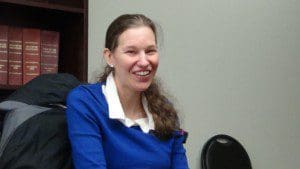
As recounted by Kristin, when she was young, her parents were told that because of Kristin’s disability, they should lower their expectations for her future success, but today she continues to defy those recommendations. She has become a strong self-advocate, unwavering in her efforts to speak out for positive changes for people with disabilities in New York City.
While meeting with public officials in Albany, Kristin explained why self-advocacy should be taught in public schools, for students with and without disabilities. “It would help to stop teasing and bullying. It will also be a way for kids to learn what disabilities are and how important it is,” she said. “They will also learn their rights [and learn] to lobby. So I want you guys to help us to get that into schools because I think it’s very important for everybody to be involved and to know this stuff.”
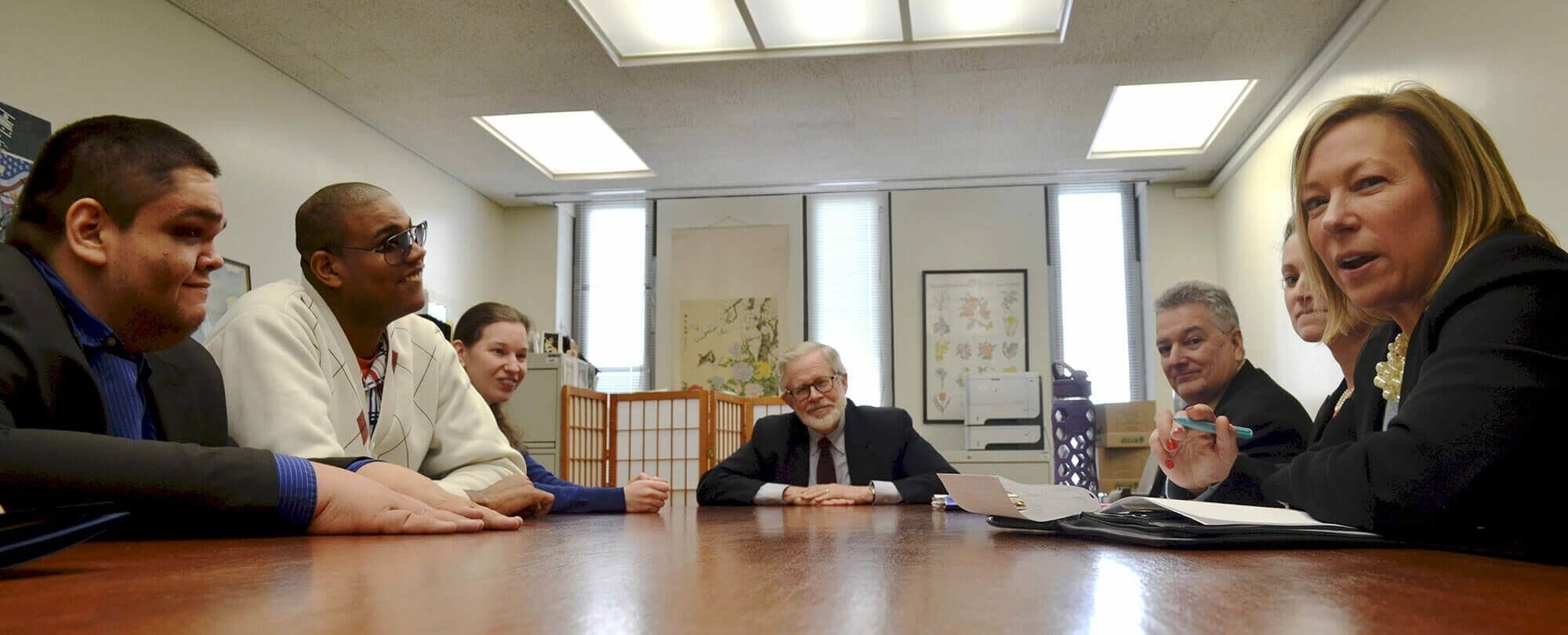
Through her advocacy and CSP work at AHRC NYC, Kristin has discovered a love for teaching, and she’s eager to spread knowledge about different types of disabilities, and how people can be supportive. During a meeting with Assembly Member, Richard N. Gottfried, Chair of the New York State Assembly Committee on Health, Kristin’s talking point led to a group discussion of ways that self-advocacy education might be included in student curriculum and teacher sensitivity training. Kristin and Victor each stated their desire to visit public schools to meet with students and teachers, to share a message of inclusion of people with disabilities, and the importance of self-advocacy.
“It will help other teachers to see the potential in their lives,” said Kristin. “I don’t mind going and teaching.”
Assembly Member Gottfried suggested that AHRC NYC and the self-advocates could work to arrange a meeting with the New York City Department of Education to discuss an agenda for training with school staff. Noting the employment issues also raised during the meeting by Victor and Andreina, he suggested an idea. “This could be a program in which some of you could be employed to go out to schools to work with students… If the City or any school district around the state decides to put together a program, that [program] can then become a model for other communities to follow.”
Direct Support Professionals Deserve a Living Wage
Chad DeRoche receives services through AHRC NYC’s Brooklyn Day Services. For over three years, Chad has advocated on the behalf of the staff who support him each day, by calling for higher wages for Direct Support Professionals
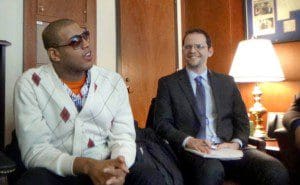
“Last year I asked you for a $15 minimum wage,” Chad said during each of his meetings with his legislators. “Thank you very much for passing it, but I want to do more… DSPs don’t make enough money, and they have a difficult job. I want to support them too. I want Governor Cuomo to open up his heart in 2017 and make that happen for them… They need it right now. They can’t wait that long to have that money they need.”
In 2016, New York State approved an increase in the statewide minimum wage to $15 per hour, to be phased in over the next three years. They did not, however, provide requisite funding in the budget for service providers to afford the rise in pay. Additionally, DSP salaries were not provided with an adequate raise, meaning many employees in the field of disabilities services will soon be earning the same as others in less-demanding and less-skilled jobs outside of the human services field.
“People don’t understand that DSPs and CSPs – they know everything about us,” Kristin added. “They know what makes us sad, what makes us happy, and what we’re good at. We trust this person and then they leave, and a new person comes, and we have to learn that trust all over again. It’s really hard.”
On March 28, 2017, Governor Cuomo announced the inclusion of $55 million in the New York State budget for direct care worker wage hikes. This is the result of years of advocacy by Chad, other self-advocates with disabilities across the state, and many others. We thank everyone who made sure their voices were heard!
People don’t understand that DSPs and CSPs – they know everything about us,” Kristin added. “They know what makes us sad, what makes us happy, and what we’re good at. We trust this person and then they leave, and a new person comes, and we have to learn that trust all over again. It’s really hard
Additional Funding is Needed for Job Preparation Programs
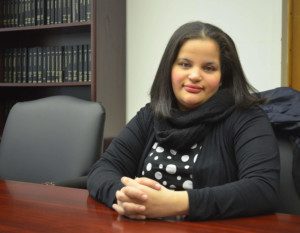
Victor Carrion and Andreina Martinez used the meetings to encourage legislators to provide additional support for people who want jobs.
“I’m the Secretary of the self-advocacy meeting, and I’m here because the members of the self-advocacy meeting need jobs,”said Andreina, who receives support from AHRC NYC’s Betty Pendler Day Services. “We need more money in the budget for help.”
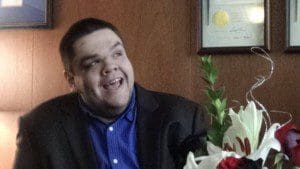
“I am here to help other people to get jobs, whether they are disabled or not,” said Victor, who receives services through AHRC NYC’s EBS Brooklyn, where he also works part-time, answering phone calls and welcoming visitors three days per week. “It’s not easy to get or keep a job.” In order to obtain his job, Victor participated in work preparation training and volunteering opportunities in his community. He learned valuable employment skills that allowed him to meet his goals: getting a job, saving his own money, and practicing reading. “I like my job because I get to help other people and support my family. I want you to put more money into the budget for more employment training programs, so this way, other people can get jobs that are right for them.”
“Employment is a big theme at AHRC, and across the whole state,” said Steve Towler, Assistant Executive Director, AHRC NYC. “New York is an employment first state, but sometimes, some of the actions – you wonder whether it really wants to be an employment first state.”
Peter Rakowsky, Legislative Aide to Senator Diane Savino of the 23rd District, asked for specifics on ways the money could be added to the budget to bolster employment preparation programs.
Steve recommended that the Office for People with Developmental Disabilities, (OPWDD) add more money into the budget and adjust the rates system it uses for supported employment, which is challenging to organizations in the disability services field. He also recommended that additional money should be provided to Adult Career and Continuing Education Services-Vocational Rehabilitation, (ACCES-VR), which assists individuals with disabilities to achieve and maintain employment and to support independent living through training, education, rehabilitation, and career development.
Each Person Has a Voice
Today, more than ever before, people with disabilities are speaking for themselves and making choices to affect the direction of their own lives. Whether a person meets with their legislators to discuss their concerns, or simply express themselves through creative means, self-advocates continue to prove that they are empowered to act as agents of social change.
AHRC NYC is proud to celebrate the ongoing work of self-advocates, as they work to make positive changes in their communities, as well as the public officials who took the time to listen to their concerns. We also would like to thank Lauren E. Pollow, Government Affairs & Policy Associate, and Lisa M. Wickens-Alteri, President of Capital Health Consulting LLC, the Albany-based firm who worked to arrange the meetings between the self-advocates and their legislators.
